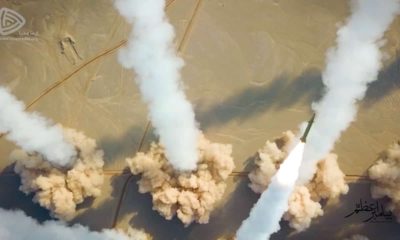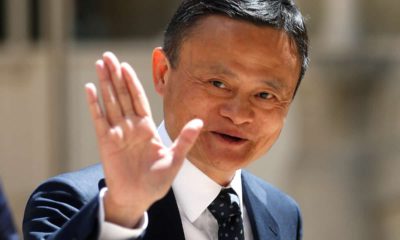AP News
EU Rebukes Iran Over Nuclear Violations, Sanctions Possible
Published
5 years agoon
By
AP News
BRUSSELS — Britain, France and Germany ratcheted up pressure on Iran Tuesday to cease its violations of a landmark nuclear deal, stressing that they want to resolve differences through talks while starting the clock on a process that could result in a so-called “snapback” of United Nations sanctions.
The three said they rejected Tehran’s argument that Iran was justified in violating the deal because the United States broke the agreement by pulling out unilaterally in 2018.
“We have therefore been left with no choice, given Iran’s actions, but to register today our concerns that Iran is not meeting its commitments,” the countries said in a joint statement.
EU foreign policy chief Josep Borrell, who coordinates the agreement on behalf of the world powers, said the pressure on Iran from Europe does not mean international sanctions will automatically be slapped on the Islamic Republic.
The aim of the move by France, Germany and Britain is “to find solutions and return (Iran) to full compliance within the framework of this agreement,” he said.
Hours later, Iran’s Foreign Ministry warned of a “serious and strong response” to the European move.
Distancing Themselves From Sanctions Imposed by the US
However, Foreign Ministry spokesman Abbas Mousavi said Iran was is “fully ready to answer any good will and constructive effort” that preserves the nuclear deal. He was quoted Tuesday by the official IRNA news agency.
[rlic_related_post_one]
The Europeans stressed that they want to “resolve the impasse through constructive diplomatic dialogue” and made no threat of sanctions in their statement.
They also specifically distanced themselves from sanctions imposed by the U.S., which Washington has said is part of a “maximum pressure” campaign against Tehran.
“Our three countries are not joining a campaign to implement maximum pressure against Iran,” they said. “Our hope is to bring Iran back into full compliance with its commitments.”
The 2015 nuclear deal, known as the Joint Comprehensive Plan of Action, or JCPOA, seeks to prevent Iran from producing a nuclear weapon — something Iran insists it does not want to do — by putting curbs on its atomic program in exchange for economic incentives.
Under its dispute resolution mechanism, countries have 30 days to resolve their problem, though that can be extended. If it cannot be solved, the matter could be brought before the U.N. Security Council and could then result in the snapback of sanctions that had been lifted under the deal.

FILE – In this Dec. 23, 2019 file photo released by the Atomic Energy Organization of Iran, technicians work at the Arak heavy water reactor’s secondary circuit, as officials and media visit the site, near Arak, Iran. Britain, France and Germany said Tuesday Jan. 14, 2020, they are triggering a dispute mechanism that is part of the nuclear deal with Iran over its failure to live up to terms of the pact. (Atomic Energy Organization of Iran via AP, File)
China and Russia Had Been Against Invoking the Dispute Mechanism
U.S. President Donald Trump unilaterally pulled the U.S. out in May 2018, saying the pact was insufficient and should be re-negotiated because it didn’t address Iran’s ballistic missile program or its involvement in regional conflicts. Since then he has reinstated American sanctions, which have been having a devastating effect on Iran’s economy.
China and Russia had been against invoking the dispute mechanism, but German Foreign Minister Heiko Maas said in a statement that the three European countries “could no longer leave the growing Iranian violations of the nuclear agreement unanswered.”
“Our goal is clear: we want to preserve the accord and come to a diplomatic solution within the agreement,” Maas readded. “We will tackle this together with all partners in the agreement. We call on Iran to participate constructively in the negotiation process that is now beginning.”
Following the announcement, Russia’s ambassador to international organizations in Vienna, Mikhail Ulyanov, tweeted that he hoped the decision wouldn’t “complicate the situation further.”
After its top general was killed in a U.S. drone attack earlier this month, Iran announced what it said was its fifth and final step in violating the deal, saying it no longer will abide by any limitation to its enrichment activities. At the same time it again said all of its violations were reversible if it gets the economic relief it wants.
‘The Government in Iran Has a Choice’
With the growing skepticism that the deal will be able to saved, British Prime Minister Boris Johnson on Tuesday suggesting that maybe the agreement could be somehow re-worked to address some of the concerns raised by Trump when he pulled the U.S. out.
[rlic_related_post_two]
“Let’s work together to replace the JCPOA with the Trump deal,” he told the BBC.
Borrell refused to comment on the suggestion, but again emphasized that the remaining signatories to the deal, which took years to negotiate, feel it is the best solution to limiting Iran’s nuclear ambitions.
“We have to preserve the nuclear deal and work to go back to full and effective implementation,” Borrell told reporters in Strasbourg, France. He described the pact as a “significant achievement” and underlined that “there is no alternative to this agreement.”
Britain’s Foreign Secretary Dominic Raab told Parliament that “the government in Iran has a choice.”
“The regime can take the steps to de-escalate tensions and adhere to the basic rules of international law. Or sink deeper and deeper into political and economic isolation,” he said. “We urge Iran to work with us to save the deal.”
You may like
-


Bill McEwen: Five Steps to Heal America Under Biden
-


Kremlin Brushes Aside Western Calls to Release Navalny
-


Pompeo Says China’s Policies on Muslims Amount to ‘Genocide’
-


Iranian Guard Drones in Drill Mirror Those in Saudi Attacks
-


Where Is Jack Ma, China’s E-Commerce Pioneer?
-


South Korean Tanker Was Boarded by Armed Iran Guard Forces













